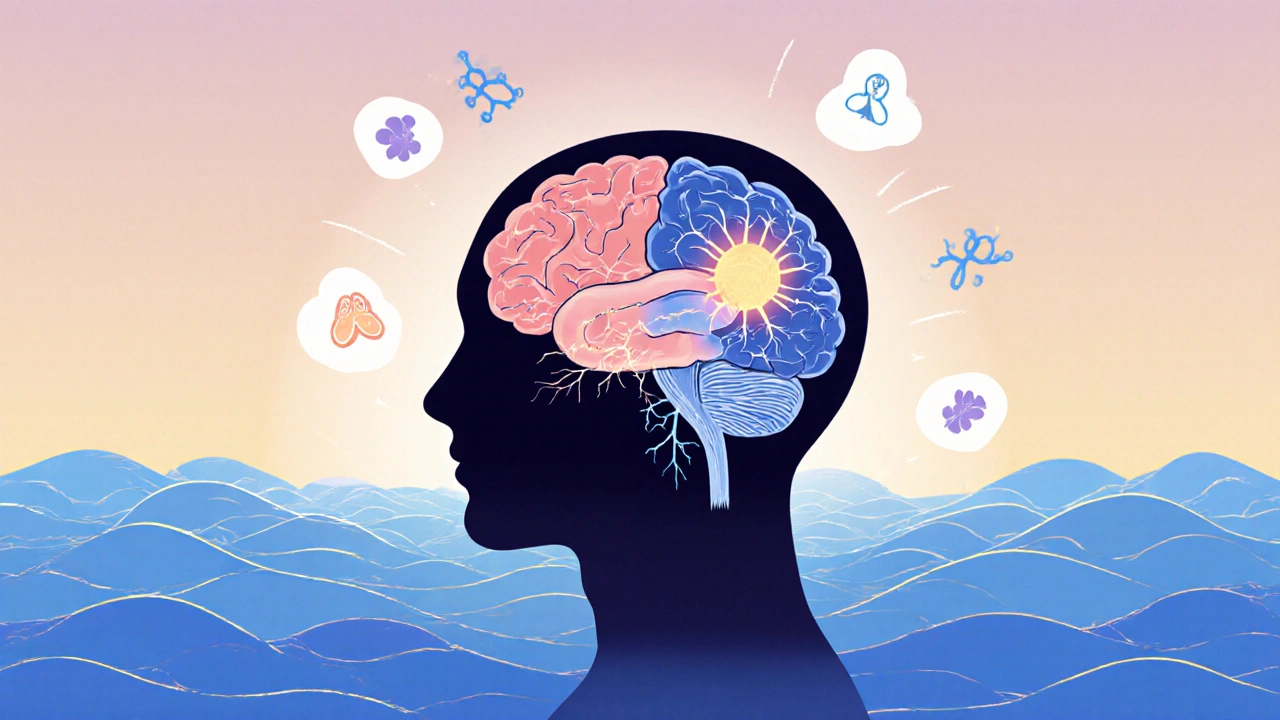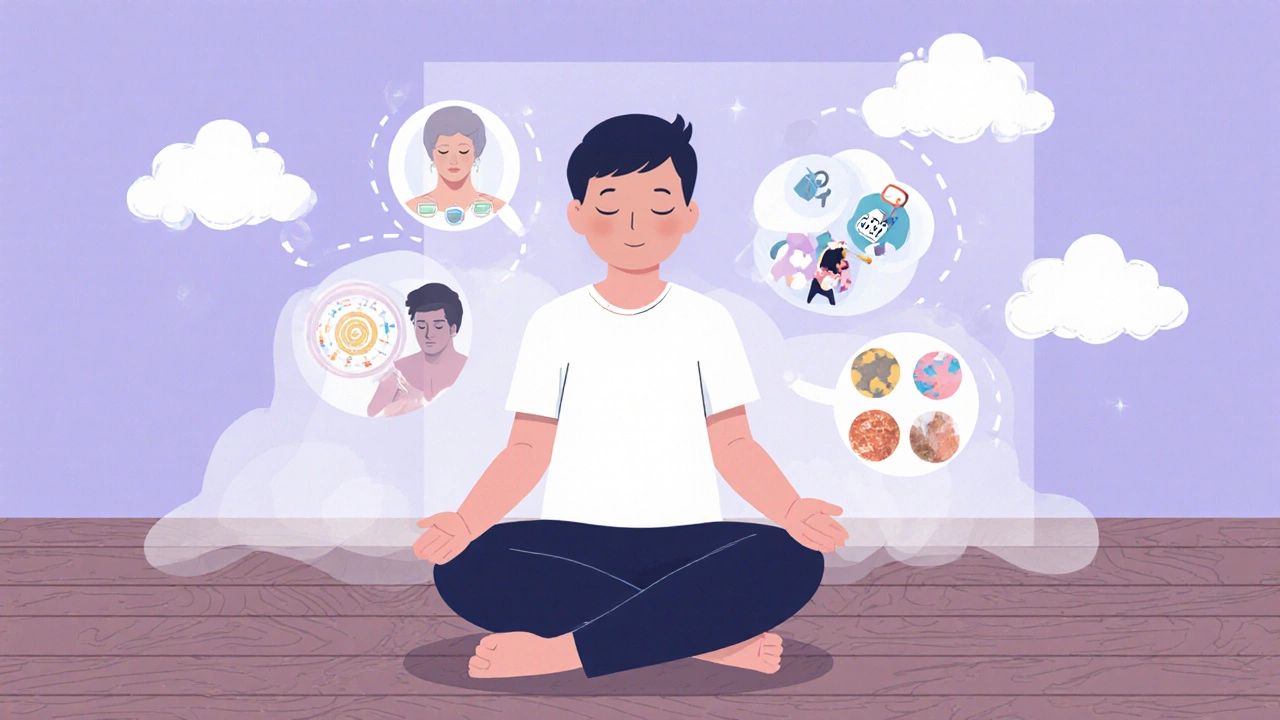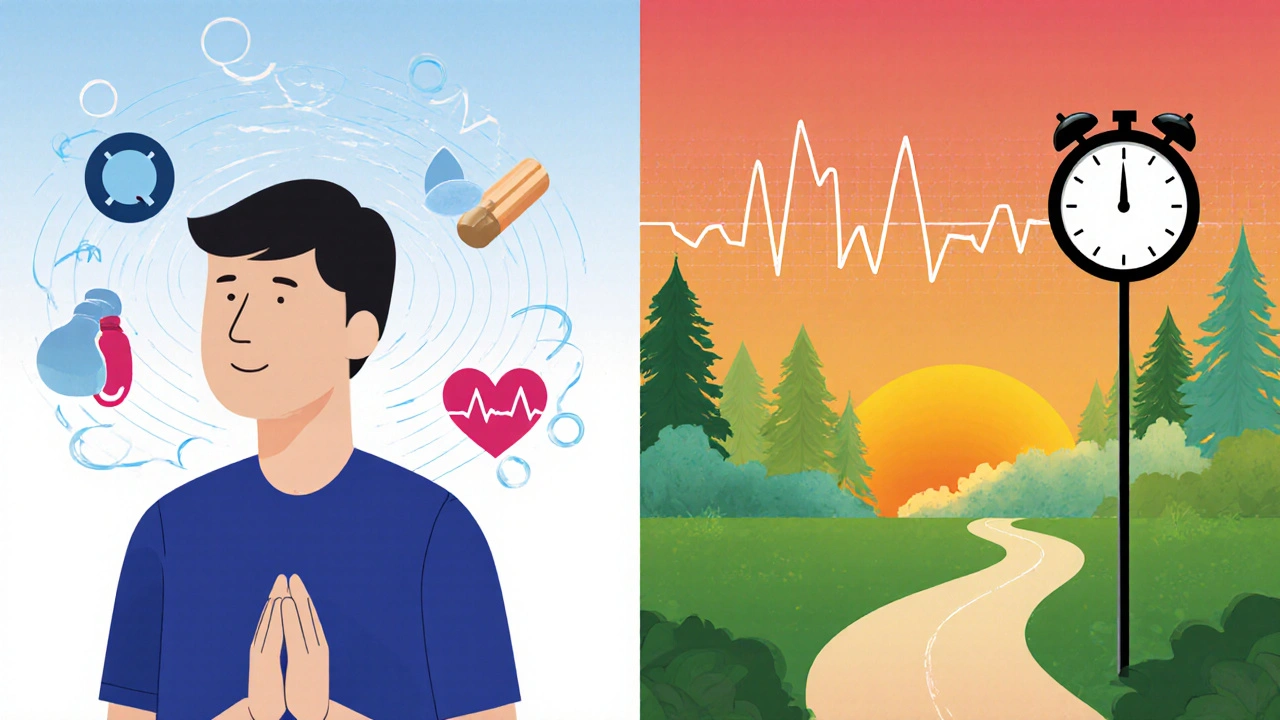Mindfulness for Anxiety: Proven Techniques and Clinical Evidence
 Nov, 10 2025
Nov, 10 2025
When anxiety feels like a constant hum in the background of your life - racing thoughts at night, tight chest in meetings, dread before social events - it’s easy to reach for quick fixes. But what if the most effective tool isn’t a pill, but a practice you can do anywhere, anytime? Mindfulness isn’t just a buzzword. It’s a clinically proven way to rewire how your brain responds to stress, with results matching first-line medications - without the side effects.
What Mindfulness Actually Does to Your Brain
Mindfulness isn’t about emptying your mind. It’s about noticing what’s happening inside you - thoughts, feelings, bodily sensations - without trying to change them. This simple shift changes your brain’s wiring. In an 8-week study published by Harvard Health, participants who practiced mindfulness daily showed a 4.1% increase in gray matter in the hippocampus, the area tied to memory and emotional regulation. At the same time, their amygdala - the brain’s fear center - shrank by 6.3%. That’s not magic. That’s biology.This isn’t theoretical. Brain scans from real clinical trials show that when you consistently pay attention to your breath or body without judgment, you’re literally calming the alarm system that’s been stuck on high. The result? Fewer panic spirals, less rumination, and more space between a trigger and your reaction.
The Two Best-Researched Programs: MBSR and MBCT
Not all mindfulness is the same. Two programs stand out in clinical research: Mindfulness-Based Stress Reduction (MBSR) and Mindfulness-Based Cognitive Therapy (MBCT). Both are structured, evidence-based, and backed by decades of peer-reviewed studies.MBSR, created by Jon Kabat-Zinn in 1979, is an 8-week program with weekly 2.5-hour sessions and 45 minutes of daily home practice. It teaches body scans, sitting meditation, and gentle yoga. MBCT builds on MBSR but adds cognitive therapy elements to prevent relapse in people with recurring anxiety or depression. Both are now listed as first-line psychological treatments by major medical associations.
A 2022 JAMA Psychiatry trial compared MBSR directly to escitalopram, a common anxiety medication. The results? MBSR led to a 48.6% remission rate. Escitalopram? 50.9%. The difference wasn’t statistically meaningful. But here’s the kicker: 82.3% of people on escitalopram reported side effects like nausea, insomnia, or sexual dysfunction. Zero of those came with mindfulness.
Core Techniques That Work - And How They Work
You don’t need to sit cross-legged for hours. Three techniques have the strongest clinical backing:- Body Scan: Lying down, you slowly bring attention to each part of your body - toes to head. This isn’t relaxation; it’s reconnection. A 2023 study found it increased heart rate variability (a key marker of stress resilience) by 32.7% and lowered the stress-to-recovery ratio by 28.4%.
- Diaphragmatic Breathing: Slow, deep breaths - around 5.5 per minute - activate your parasympathetic nervous system. That’s your body’s natural “off switch” for fight-or-flight. Just 5 minutes can drop cortisol levels by nearly 27%.
- Grounding Exercises: When anxiety spikes, focus on five things you can see, four you can touch, three you can hear, two you can smell, one you can taste. It pulls you out of your thoughts and into your body. Used in trauma therapy, it’s now standard in anxiety clinics.
These aren’t just feel-good tips. Each has measurable physiological effects. You’re not imagining calm. You’re changing your nervous system’s set point.

Mindfulness vs. CBT vs. Medication: What’s Best for You?
People often ask: Should I choose mindfulness, therapy, or meds? The answer depends on your goals.Speed: CBT gives faster relief - about 27% improvement in symptoms by week 4. Mindfulness takes longer - around 18.6% at the same point. If you need quick symptom control, CBT or medication may be better short-term.
Long-Term Results: Here’s where mindfulness shines. After 12 months, people who did MBCT had a 68.4% lower chance of relapse. CBT users? 47.2%. Mindfulness teaches you to relate differently to anxiety, so it doesn’t come back as easily.
Side Effects: Medications carry physical risks. CBT requires time and emotional labor. Mindfulness requires consistency - but no pills, no appointments, no chemical changes in your body. It’s the only option that builds resilience without altering your chemistry.
For generalized anxiety disorder (GAD) or test anxiety, mindfulness shows up to 71.3% symptom reduction. For acute panic attacks? Medication still wins - because you need fast, targeted intervention. But for daily, chronic anxiety? Mindfulness is the quiet powerhouse.
What the Research Says About Apps and Online Programs
You’ve probably tried Headspace, Calm, or Insight Timer. They’re popular - and mostly unproven for clinical anxiety.The 2022 JAMA trial that showed mindfulness matching medication? It used in-person, guided instruction. Participants had trained teachers, group support, and structured feedback. Most apps offer recordings - no human guidance, no accountability. That’s why a 2023 survey found that 54.7% of app users struggled to stay consistent.
And here’s the hard truth: There are no FDA-approved mindfulness apps for anxiety. The FDA has cleared apps for insomnia and substance use, but not for anxiety. That means most apps are sold as “wellness tools,” not medical treatments. They can help - but don’t expect the same results as a clinical program.
If you’re using an app, pair it with a certified instructor. Look for MBSR or MBCT programs through hospitals, universities, or mental health clinics. Many offer sliding-scale fees. In the U.S., over 1,200 certified MBSR instructors are listed by the Center for Mindfulness. You don’t need to travel far.

Real People, Real Results
Reddit threads and user surveys tell stories that stats can’t capture. One user, u/AnxiousEngineer, wrote: “After six weeks of daily body scans, my GAD-7 score dropped from 15 to 6. My psychiatrist said that’s what escitalopram would do. I got the same result - no nausea, no brain fog.”A 2023 survey of 1,247 mindfulness practitioners found 68.4% felt less anxious within eight weeks. Eighty-seven percent said they had better emotional control. These aren’t outliers. They’re the norm for people who stick with it.
But it’s not easy. Nearly 30% of people in clinical trials felt worse at first - anxiety spiked during early practice. That’s normal. It’s not failure. It’s your brain surfacing old stress patterns. The key is not to push through it, but to notice it with kindness. “I’m feeling anxious right now,” you say. “That’s okay. I’m here with it.”
How to Start - Without Overwhelming Yourself
You don’t need to meditate for an hour. Start small.- Day 1-7: Sit quietly for 5 minutes. Focus only on your breath. When your mind wanders (and it will - 15-20 times is normal), gently bring it back. No judgment.
- Week 2-3: Add a 10-minute body scan before bed. Use a free guided audio from a trusted source like UCLA Mindful or the Center for Mindfulness.
- Week 4+: Build to 20 minutes daily. Try one technique per day - breathing Monday, body scan Tuesday - to keep it fresh.
Use reminders. Set a phone alert. Leave your meditation cushion by your bed. Jefferson Health found 87% of successful practitioners use some kind of cue to stay consistent.
And remember: Progress isn’t linear. Some days you’ll feel calm. Other days, your mind will race. That’s not a bad session. That’s practice.
The Future of Mindfulness: Personalized and Accessible
The field is evolving fast. In 2023, MIT researchers used AI to match mindfulness techniques to individual physiology - like heart rate and skin conductance - and boosted effectiveness by 37.2%. The NIH is funding a $2.3 million trial (NCT04987128) to test whether virtual MBSR can match in-person results. Early data suggests it might work even better in BIPOC communities.By 2028, the American Psychological Association predicts mindfulness will move from second-line to first-line treatment for anxiety. But until then, it’s already a powerful, accessible tool - free from side effects, available anytime, and backed by more science than most supplements or trendy therapies.
You don’t need to be spiritual. You don’t need to buy anything. You just need to show up - for five minutes, every day - and notice what’s already here.
How long does it take for mindfulness to reduce anxiety?
Most people notice small changes in 2-4 weeks, but clinically significant results - like those seen in trials - typically take 8 weeks of consistent daily practice. The 2022 JAMA trial required participants to practice 45 minutes a day, 6 days a week, for 8 weeks to match medication outcomes. Don’t expect overnight results. Expect gradual, lasting change.
Can mindfulness replace medication for anxiety?
For many people with generalized anxiety disorder, yes - especially if they prefer to avoid side effects. The 2022 JAMA trial showed MBSR was noninferior to escitalopram. But for severe, acute, or panic-based anxiety, medication may still be necessary as a first step. Always consult your doctor before stopping or switching treatments. Mindfulness works best as a complement or alternative - not a replacement - when medically supervised.
Is mindfulness safe for everyone?
Yes - but with caveats. Most people benefit. However, about 28% of participants in clinical trials reported temporary increases in anxiety or emotional discomfort during early practice. This usually fades with time and proper guidance. If you have trauma, severe depression, or psychosis, work with a trained therapist who can adapt techniques. Mindfulness isn’t a cure-all, but it’s rarely harmful when practiced mindfully.
What’s the difference between MBSR and MBCT?
MBSR (Mindfulness-Based Stress Reduction) focuses on reducing stress and physical tension through body awareness and breath. MBCT (Mindfulness-Based Cognitive Therapy) adds cognitive strategies to help people recognize and disengage from negative thought patterns that fuel anxiety and depression. MBSR is great for general anxiety. MBCT is especially effective for people with recurring anxiety or a history of depression.
Do I need to meditate every day?
For clinical results, yes - at least 5-10 minutes daily. Studies show that skipping days reduces effectiveness. It’s not about perfection. Even 3 days a week helps, but 6-7 days is what moves the needle in trials. Think of it like brushing your teeth: you don’t skip because you’re tired. You do it because it’s part of staying well.
Can mindfulness help with physical symptoms of anxiety?
Absolutely. Beyond mental calm, mindfulness reduces muscle tension, lowers blood pressure by 19.4%, improves sleep quality by 22.7%, and even helps regulate blood sugar in people with diabetes. These aren’t side effects - they’re direct results of calming your nervous system. When your body stops living in fight-or-flight mode, all systems benefit.
Why do some people say mindfulness doesn’t work for them?
Because it’s not one-size-fits-all. Research shows huge variability in response - some people thrive, others don’t. This isn’t failure. It’s biology. Dr. Stefan Hofmann’s work suggests individual differences in brain structure and stress history affect outcomes. If one technique doesn’t work, try another. Try walking meditation. Try journaling with awareness. Or try a guided class. The goal isn’t to “do it right.” It’s to find what helps you feel more grounded.
If you’ve tried everything else and still feel on edge, mindfulness might be the quiet solution you’ve overlooked. It doesn’t promise perfection. But it does offer something rarer: the ability to be with your anxiety - without being ruled by it.

edgar popa
November 12, 2025 AT 06:27Gary Hattis
November 12, 2025 AT 13:33Esperanza Decor
November 14, 2025 AT 01:24Deepa Lakshminarasimhan
November 14, 2025 AT 08:30Erica Cruz
November 14, 2025 AT 15:58Johnson Abraham
November 14, 2025 AT 19:42Shante Ajadeen
November 14, 2025 AT 23:30dace yates
November 15, 2025 AT 13:30Danae Miley
November 16, 2025 AT 04:03Charles Lewis
November 17, 2025 AT 11:57Renee Ruth
November 18, 2025 AT 13:08Samantha Wade
November 20, 2025 AT 11:04Arpita Shukla
November 21, 2025 AT 22:05